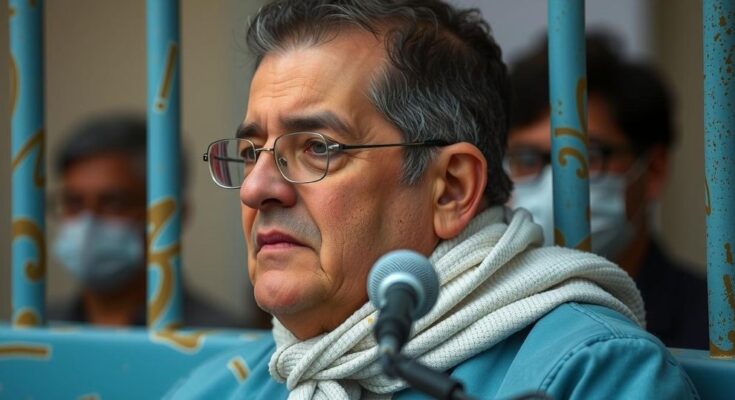Said Ait Mahdi, a Moroccan activist, was sentenced to three months in prison for leading protests against the government’s inadequate response to the September 2023 earthquake. His case has drawn international condemnation, highlighting issues of civil liberties and accountability in the aftermath of the disaster that killed nearly 3,000 people and caused extensive damage in the Al Haouz region. Activist groups continue to demand a quicker recovery process, underscoring the frustrations of earthquake victims awaiting support.
On Monday, Said Ait Mahdi, a prominent activist in Morocco, received a three-month prison sentence following his protests against the government’s inadequate response to the devastating earthquake that struck the Al Haouz region in September 2023. Charged with defamation, assault, and inciting unauthorized demonstrations, Mahdi’s case has drawn widespread condemnation from human rights groups who assert that the ruling is politically motivated. Ait Mahdi is notable for being the first activist sentenced in connection with these protests, which have highlighted ongoing discontent over the slow recovery efforts, leaving many earthquake victims in temporary shelters. Despite the court’s ruling, there have been intermittent protests challenging the government’s handling of the crisis.
The September earthquake, measuring 6.8 on the Richter scale, resulted in the tragic loss of nearly 3,000 lives and caused extensive destruction, leaving approximately 60,000 homes and hundreds of schools damaged. The Moroccan government has committed over $11.5 billion for recovery and reconstruction, yet activist groups claim that the reconstruction pace remains sluggish. This situation has fueled protests in both rural towns and larger cities, as citizens demand accountability and faster aid distribution. Mahdi’s activism has further amplified the grievances of those suffering in the affected areas, rallying support from various NGOs and political parties advocating for civil liberties in Morocco.
In light of the increasing unrest, the Moroccan Association for Human Rights and other civil rights organizations have labeled Mahdi’s imprisonment a retaliatory act for his vocal criticism of government actions. They have emphasized that this incident mirrors broader efforts to suppress dissent in response to the government’s failure to effectively address the disaster’s aftermath. Activists, including Mahdi, have persistently highlighted the inequalities faced by indigenous communities within the region, which have been exacerbated by the government’s response to the earthquake. Moreover, demonstrations have taken place in capital cities, illustrating a unified stance among various groups advocating for the rights of the affected populations.
“Ait Mahdi is the voice of the oppressed and earthquake victims,” – Local Coordination for the Defense of Freedoms and the Right to Organize. The outcry surrounding Mahdi’s sentencing illustrates the ongoing tensions in Morocco regarding civil rights and governmental accountability amid a humanitarian crisis. His case has sparked widespread public support, as evidenced by hundreds of demonstrators advocating for his release outside the Marrakech courthouse.
In summary, the sentencing of activist Said Ait Mahdi serves as both a reflection of the political landscape in Morocco and a crucial indicator of the growing unrest among citizens demanding justice and accountability following the tragic earthquake. As recovery efforts continue to lag, the plight of the earthquake victims remains at the forefront, igniting protests and calls for reform from both grassroots organizations and concerned citizens alike. The implications of this case extend beyond Mahdi himself, suggesting a significant struggle for civil liberties in the context of disaster response and governance in Morocco.
The recent earthquake in Morocco’s Al Haouz region has highlighted significant issues related to governmental response and civil rights. Following this natural disaster on September 8, 2023, which claimed nearly 3,000 lives, citizens have expressed dissatisfaction with the pace of recovery and reconstruction. Activists like Said Ait Mahdi have emerged as pivotal figures advocating for the rights and needs of the affected populations. His recent sentencing underscores the tensions between government authority and civil society amidst calls for accountability and reform in response to the earthquake’s aftermath. This incident also exemplifies the broader trend of state suppression of dissent in Morocco.
Said Ait Mahdi’s three-month prison sentence epitomizes the struggle for civil rights within Morocco in the wake of a natural disaster. As activists demand accountability for the government’s response to the earthquake, the case reveals deep-seated societal grievances and the ongoing fight for justice among marginalized communities. The support for Mahdi reflects a significant public desire for change and highlights the challenges faced by those advocating for human rights in the region.
Original Source: www.newsday.com




